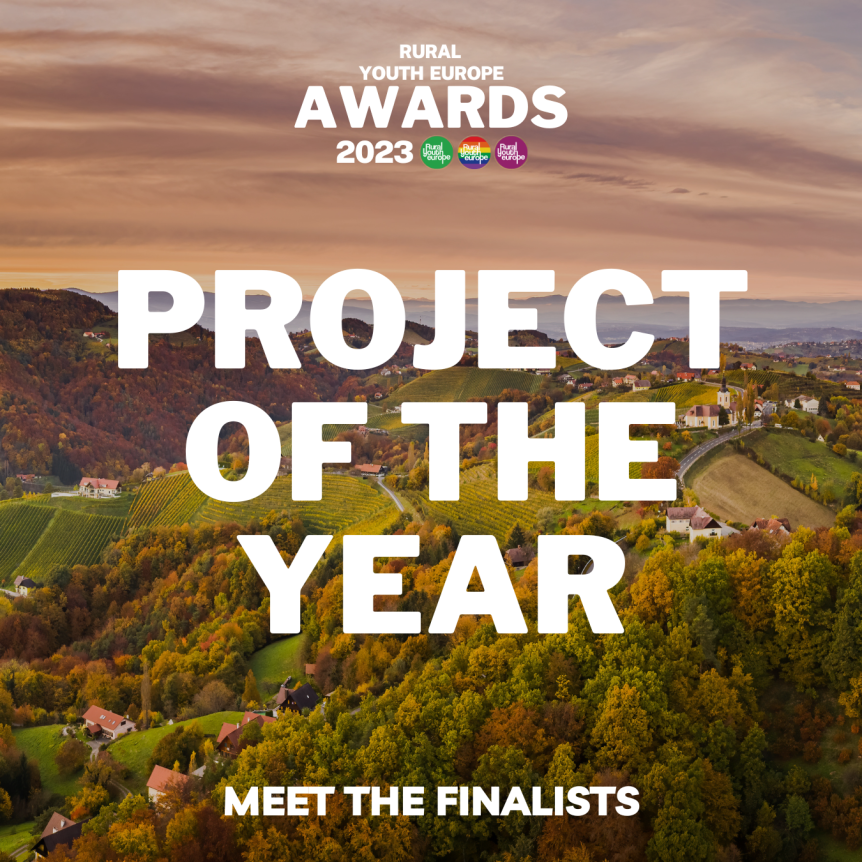We are excited to announce the top three finalists in the Project of the Year category of this year’s Rural Youth Europe Awards!
A Rural Youth Project is a project where young people have worked together towards a common goal on a voluntary basis. A project in which an individual or group of young people have worked together for the benefit of themselves, their local community or the greater good.
After an internal judging process, the top three best projects have moved on to the second stage of the competition where public voting will take place on the RYEurope Facebook page and will count for 20% of the overall score. Judging on the Facebook page will commence from 16:00 CEST on Wednesday 2nd August to 21:00 CEST on Friday 4th August.
The results of the Rural Youth Europe Awards 2023 will be announced on Saturday 5th August during the Closing Ceremony of the 2023 European Rally. Read more about the three finalists below.
Verwenden statt Verschwenden – Gemeinsam viel bewirken!” – “Use instead of waste – Together we can achieve a lot!”
Rural Youth District Mank – Landjugend Österreich

Every year, each of us simply throw around 175 kg of precious food in the trash. This is not only an ecological and economic disaster, but also a moral one. Because at the same time 35 million people die in the same period because they do not have enough to get full. Also in the region of Mank the Rural Youth District Mank has seen that the careless handling of FOOD is all around. Thus, the project “Use instead of waste – Together we can achieve a lot!” was launched in order to do something against the throwaway society.
In the project, 5 central sub-projects were implemented, with which we wanted to raise awareness of this issue.
Thus, unused fruit trees were made available to the public with the consent of the owners of the land, so that the fruit does not become rotten on the ground, but is sensibly utilized by the population. The trees were marked with white strips and published in a self-programmed platform (fruit tree map). In two other projects, regional tea blends were produced and explanation videos on important topics like “Food wasting”, “Food seasonality” or “Right behaviour in nature” were created for the society. In addition, participating local businesses were certified for their food waste according to a catalogue of measures. As last subproject, we designed special educational packages together with our teachers to learn in a playful way to deal with food. Teaching children at a young age about throwing away edible food can prevent them from forming lavish habits later on.
The project has an enormous benefit for society and nature:
- Through the sale of our fruit tree map, we were able to plant over 80 fruit trees in our region with a value of 3450,-€.
- Through our certificates, we were able to sustainably convert 62 farms to better food handling and register them with Too Good to Go. Too Good to Go is an app that connects customers with restaurants and stores that have unsold, surplus food and sells it at a discounted price to self- pickup customers.
- Our fruit tree project was picked up by the state of Lower Austria and a statewide campaign was launched in cooperation with us.
- Through our educational packages, about 700 students were taught in biology classes how to handle food properly.
- Through our project we were able to collect a total of 5250,-€ donations. With this money 300 people in Ethiopia can get an agricultural education. The ability and knowledge to produce agricultural products effectively and sustainably is of enormous importance, especially in developing countries.
In our project, a total of about 215 members from the Rural Youth district Mank were involved. Due to the huge range of our project and the commitment of so many members, a total of about 3225 voluntary hours were worked and a huge project was implemented.
Queeres Landjugendmagazin (LaMa) – Die Regenbogen-Sonderausgabe
Niedersächsische Landjugend e.V. (NLJ) – Bund der Deutschen Landjugend

The queer special edition of our rural youth magazine ‘LaMa’ has been the first bigger project of the NLJ’s Working Group “Diversity” and a very important step for our organization to take a stand for LGBTQIA+ rights. Hate speech on social media and hate crimes against members of the LGBTQIA+ community have dramatically increased worldwide for the last couple of years. The NLJ takes its social responsibility as a part of the German rural youth work very seriously and wanted to take action. With the goal of educating volunteers and employees about queer identities, issues and needs – especially in rural areas – we started brainstorming, interviewing and collecting material in 2021.
It has always been important to us to address multiple needs: On the one hand, we provide educational material for youth who are not identifying as members of the queer community themselves – in a well-founded and yet playful way. On the other hand, we support queer youth with local places to go and connect, with lists of great books, podcasts, movies and shows.
Obviously, we could not have done it all by ourselves. Queer German youth organizations supported us with their knowledge, the RYEurope allowed us to use the ‘LGBTQ+ Do’s and Don’ts Poster’ and material from the ‘Together Thursday: Creating an Inclusive Environment’ workshop.
Some highlights in the magazine are an interview with the German Federal government commissioner on queer topics, “fun with flags”, an overview and reports on pride parades in the region and several interviews with queer rural youth as well as the first German trans* “wine princess”.
With five people constantly doing editorial work and around 20 people giving advice, sharing or creating content and doing the proofreading for over about a year, our magazine has been published in December 2022. Since then, 1.300 printed copies have been delivered to young people (mostly our members) and schools in rural areas and partner organizations all over Germany. The project has also been showcased on two pages in the weekly published regional farmers newspaper “Land und Forst” (~50.000 subscribers)
With the queer special edition of our rural youth magazine ‘LaMa’, we were able to create a timeless source of information that will be used as reference book and guide in our organization in the future.
Have a look at the digital version of the Queer Rural Youth magazine here.
Give Way to Youth
Latvijas Mazpulki – Latvian 4H

Project “Give a Way to Youth!” is a complex project that includes 11 interconnected activities with the aim to improve youth opportunities to influence decision-making processes in rural areas of Latvia, so youth could feel more confident about their ability to initiate changes and feel that they belong to Latvia. Thanks to the project, the proportion of citizens who engage in civic activities has increased and the proportion of citizens who believe in their personal ability to influence decision- making processes has increased.
The goal of the project was to strengthen the culture of democracy in Latvia by integrating the experience of Norway, developing the ability of young people to influence decisions in their region and the ability of municipalities to involve young people in civic participation.
The idea of the project came from the cooperation of the whole team of the organization together with its most active young people. Being a young person who just starts to know all the norms and regulations, who is not yet familiar with the decision- making process in his country, it is easy to get confused on this roadmap “How can I be an active inhabitant of my district”. Research that has been made shows that there are opportunities to get involved, but youngsters do not use them. Why? That’s what we found out during project and are trying to change in Latvia.
One of the major activities of the project was the implementation of youth initiatives. It all started with a hackathon, when 20 teams of young people from all over Latvia came up with the idea of their initiatives within 24 hours. After that, the young people, together with the support of the mentor, implemented them throughout the summer. The project organizers followed the efforts of young people to implement their initiatives and in parallel conducted a study on how easy or difficult it is to implement initiatives in their region. Those teams that had implemented the initiatives by the end of the summer were evaluated. The winners of the first three places won an experience exchange trip to Norway to visit organization Creatorium (cooperation partner of Latvian 4H club). The young people gained experience on how Norwegian youth implement their initiatives, and the project organizers on how to mentor youth teams more successfully. The most successful examples could be implemented in Latvia’s work with youth.
Young people have gained experience and confidence. This year, some of the youth teams are again implementing their initiatives at the next level than last year.
Moreover, the project is not finished yet. Project organizers visit Latvian municipalities to convince municipal employees that youth initiatives are important in the self-growth of young people and that it is valuable to include them in the youth work budget.
Together in all project activities we do have 295 unique participants.
400 words are very little to describe the whole project. I am attaching a link to the film of the project, which was made about youth initiatives. Unfortunately, only a small part of the text in the film is in English, but we hope you can understand the general idea.

